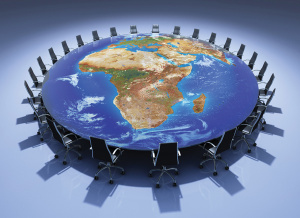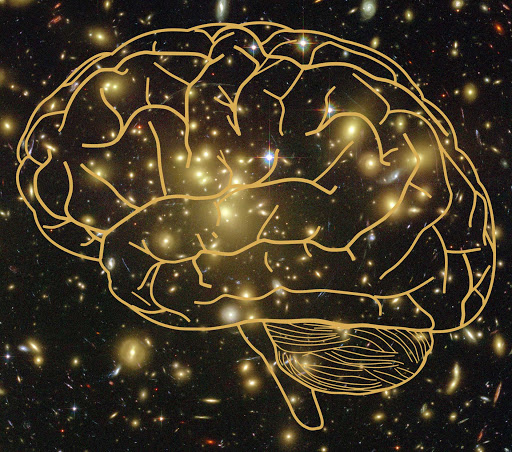People on the right believe all government is bad, except when it’s in the hands of a tyrant, and then government becomes the blunt instrument against their enemies. People on the left believe government can be a force for good, a fount of justice and a provider of equity.
Except, that is, when the subject of global governance comes up. Then, in the words of psychiatrist friend, both right and left agree that “the term conjures totalitarian images and is rejected out of hand.”
I don’t mean to draw equivalence between the right and the left at this time. Right-wing extremism is ascendant, and holds power in more and more countries. (The issue still hangs in the balance in the USA, despite the premature sigh of relief from just over half the population.)

Given that power is evil, when the right has the power, as it does in America today, it owns most of the evil. And when the left has the power, as it did in Russia with the USSR, it owns most of the evil.
So is the fear of worldwide totalitarian power from the right or the left justified when the subject of global governance arises?
The problem is that people from both sides of the political spectrum are projecting the realities of the present and past onto the non-reality of the future in their knee-jerk reaction to the question of global governance.
The word is not the thing, but let’s be clear about what we mean, and don’t mean, by the term ‘global governance.’
First, it does not mean global government, with power concentrated in the hands of the hapless United Nations for example. In fact, global g0vernance doesn’t necessarily imply control, much less coercion at all.
Global governance simply means the effective, just and equitable management of the global commons.
Most reasonable people would agree regarding the necessity of managing the many global challenges humankind faces, but few see the increasing imperative of effective global governance.
First and foremost is the environment. If man continues to destroy the viability of the Earth’s ecosystems, and the diversity of fauna and flora, then all other questions will soon become moot.
Even if ecological collapse doesn’t occur in the years ahead, due to runaway climate change, oceanic desertification, or pandemics resulting from the Sixth Extinction that will make Covid-19 seem like a walk in park, no rationally feeling woman or man would want to have a child on such a planet that man is making of this jewel in the galaxy.
Besides, there’s an inbuilt, insurmountable hurdle to effective global governance, much less coercive world government.
Humans are tribal hominids that identify with particular groups, whether that group was the last 25 people of Ishi’s tribe before they were exterminated in this part of northern California, or the 2.5 billion Chinese nationalists that are using the overwhelming ‘soft power’ of their economy to dominate the world.
In short, world government almost certainly will never happen. And effective, just and non-power-based global governance requires a revolution in human consciousness the likes of which humankind has never seen.
The reason is simple, though hardly simplistic. ‘Human nature’ is tribalistic, and has been since “fully modern humans” first exploded onto the evolutionary scene about 70,000 years ago. It will take a revolution in consciousness that surpasses the Cognitive Revolution at that time to transform man the tribal hominid into a human being that emotionally perceives humanity as whole first.
This is why no vision and political strategy for global governance is worth consideration if it’s not based on psychological revolution–an explosion of insight in the exapted brain of humans fully awakening insight within. Can such an insight revolution ignite now?
Many in the purportedly awakened community take refuge in a perverse kind of detachment, which comfortably doubts whether humankind faces an unprecedented crisis.
This privileged view is not just held by a few. Including incorrigible consumerists and soulless nihilists, it’s held by a majority of Westerners. And the virus of individualism that underlies and feeds it has already spread around the world.

The crisis of human consciousness is not separate from the ecological and political crises; it is the source of them, and they are the manifestations of it. Therefore the crisis is of the human species itself on this planet, which man has come to so dominate that we’ve named an age after ourselves—the Anthropocene Age.
Last week, President-elect Biden said, “America is back, ready to lead the world.” He obviously believes the world faces a choice between the atavistic nationalism of Trumpism, and the good old days of American centrality, exceptionalism and leadership.
The truth is that Trump kicked the last strut out of that conceit, as well as the post-World War II international order itself. The global society as it is now faces the urgent necessity of creating a fair and workable global order.
As many have pointed out, Mr. Biden’s advisers are multilateralists by American standards. Antony Blinkin, the incoming Secretary of State about to step into the tiny shoes of Mike Pompeo, rightly says, “Whether we like it or not, the world simply does not organize itself.”
Then Blinkin wrongly says: “When some other country tries to take our place or, maybe even worse, no one does, you end up with a vacuum that is filled by bad events.” Is there no alternative between Chinese, Russian or American authoritarianism, the blinkered left, and Blinken revisionists?
American progressives believe the present international affords the prospect of “cooperation without dominance,” but China and Russia just laugh at such naïveté.
The world is confronted with both residual American exceptionalism (and a trillion-dollar a year military), and the vacuum of global leadership. But is there such a thing as true global leadership?
If you define leadership as “the first or foremost place,” or “to control a group of people,” no, there is no such thing as global leadership.
But if you define leadership as, “guidance, direction, management and the action of leading people,” then leadership is indispensible. Whether it’s true or false depends on the civic participation in the people and the caliber of political leaders.
The liberal worldview maintains that “rather than seeking to dominate the world, the United States should show ‘solidarity’ with it: first, by curbing its own contributions to global misery and second, by joining with others to battle poverty, insecurity and injustice.”
That sounds wonderful, but such solidarity will still requires leadership, and it cannot come from America anymore. Then where from?
From human beings who have ended tribalism within themselves. And from those who have the capacity to speak for the Earth and humanity as a whole.
There is no return to the status quo ante Trump, not for America or for the West, or for the world. The worst will continue to fill the vacuum until the best step forward, and make just, effective global governance a reality.
Martin LeFevre

